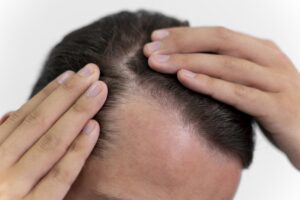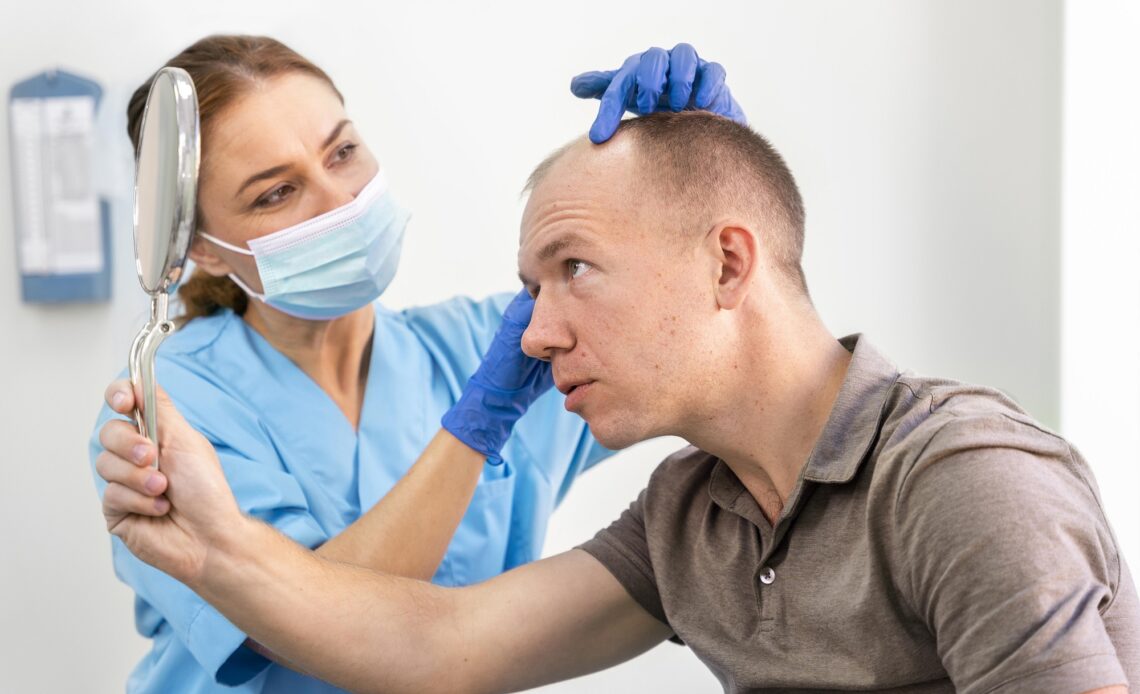Introduction
Hair loss can be a distressing experience, but the good news is that there are various treatments available to address the issue. Whether you’re using topical treatments, prescription medications, or undergoing procedures like hair transplants, you can enhance the effectiveness of your hair loss treatment by making some positive lifestyle changes and following a few helpful tips. In this blog post, we’ll explore practical strategies to optimize the results of your hair loss treatment.
Consult a Professional
Consulting a healthcare professional or dermatologist is a pivotal step in any journey to address hair loss. These experts play a crucial role in providing a thorough and accurate diagnosis of the underlying cause of your hair loss, whether it’s due to genetic factors, hormonal imbalances, nutritional deficiencies, or other conditions. By identifying the root cause, they can guide you toward the most appropriate and personalized treatment plan, whether it involves topical solutions, prescription medications, lifestyle adjustments, or even hair transplant procedures. This professional guidance ensures that your chosen treatment aligns with the specific nature of your hair loss, increasing the likelihood of its success. Moreover, it prevents the risk of ineffective or potentially harmful treatments and underscores the importance of a tailored approach to address this common concern.

Consistency Is Key
Consistency is the linchpin of any successful hair loss treatment. It underpins the entire process, ensuring that the selected treatment plan can work as intended. Following the prescribed application or usage instructions with unwavering dedication is crucial, whether it involves applying a topical solution, taking prescription medication, or adhering to a specific regimen. Hair growth and recovery are gradual processes, and the biological mechanisms involved demand regular and systematic intervention. Deviating from the routine or skipping doses can disrupt the efficacy of the treatment, potentially leading to suboptimal results. In essence, consistency serves as the bedrock upon which the success of your hair loss treatment is built, providing the best chance for noticeable improvements in hair health and regrowth over time.
Healthy Diet and Nutrition
A healthy diet and proper nutrition play a pivotal role in the quality and vitality of your hair. The connection between what you eat and the health of your hair is undeniable. Essential nutrients, including vitamins, minerals, and proteins, are crucial for supporting hair growth and overall hair health. Foods like eggs, rich in biotin, and fatty fish, which provide omega-3 fatty acids, nourish hair follicles and promote strength and sheen. Leafy greens supply iron, an essential mineral for hair growth, while nuts offer a source of zinc, which can help prevent hair loss. To ensure you’re getting the right balance of these nutrients and others, it’s advisable to consult with a nutritionist who can help tailor your diet to maximize the effectiveness of your hair loss treatment and contribute to healthier, more vibrant hair.
Stress Management
Stress management is a crucial component in the battle against hair loss. It’s well-documented that high-stress levels can exacerbate hair loss, as chronic stress can disrupt the natural hair growth cycle and lead to increased shedding. Stress-induced hair loss often manifests as excessive hair fall and thinning. To enhance the effectiveness of your hair loss treatment, it’s essential to incorporate stress management techniques into your daily routine. Practices such as yoga and meditation promote relaxation and reduce stress hormones in the body, positively impacting hair health. Regular exercise not only reduces stress but also improves blood circulation, helping to deliver vital nutrients to the hair follicles. Relaxation exercises can alleviate tension and anxiety, ultimately supporting the hair’s regrowth process. By managing stress effectively, you’re not only contributing to your overall well-being but also creating a more conducive environment for your hair loss treatment to yield better results.
Scalp Care
Scalp care is an essential element in promoting healthy hair growth and ensuring the efficacy of hair loss treatments. Your scalp’s condition is the foundation upon which your hair health rests. Regularly cleansing and exfoliating your scalp is key to maintaining an optimal environment for hair growth. When the scalp is clogged with excess oils, dirt, and dead skin cells, it can hinder the hair follicles’ ability to produce strong, healthy strands. A clean scalp encourages better circulation and allows topical treatments to penetrate more effectively. Exfoliation removes debris and enhances the absorption of essential nutrients. In addition to cleansing and exfoliating, it’s important to use gentle, sulfate-free shampoos and avoid overwashing, which can strip the scalp of natural oils. By taking care of your scalp, you create the ideal foundation for your hair loss treatment to work more effectively, ultimately promoting stronger, thicker, and healthier hair.
Avoid Heat and Chemical Damage
Protecting your hair from heat and chemical damage is a critical aspect of maintaining healthy, vibrant hair and ensuring the success of your hair loss treatment. Excessive use of heat styling tools such as straighteners and curling irons, along with harsh chemical treatments like bleaching or perming, can weaken and damage the hair shaft, making it more susceptible to breakage and thinning.
To improve the effectiveness of your hair loss treatment, minimize the use of heat styling tools and opt for heat protectant products when you do use them. Additionally, choose gentle hair care products, including sulfate-free shampoos and conditioners, to prevent further damage. Avoid tight hairstyles like braids and ponytails that place excessive tension on the hair and scalp, as this can lead to a condition known as traction alopecia. By protecting your hair from heat and chemical damage and opting for hairstyles that are gentle on your locks, you help preserve your existing hair and create a more conducive environment for regrowth, ultimately enhancing the success of your hair loss treatment.

Protect Your Hair from the Sun
Protecting your hair from the sun is an often overlooked but crucial aspect of maintaining healthy hair and supporting the effectiveness of your hair loss treatment. Excessive sun exposure can lead to a range of issues, including dry, brittle hair, discoloration, and a damaged scalp. The sun’s harmful UV rays can weaken the hair shaft, making it more susceptible to breakage and thinning. To enhance the success of your hair loss treatment, especially in hot and sunny conditions, it’s essential to take precautions.
Using a hat or a scarf to shield your hair from the sun’s harmful UV rays is an excellent practice. This simple yet effective measure not only protects your hair but also helps maintain a healthy scalp, providing a conducive environment for hair growth. In addition to physical protection, consider using hair products that contain UV filters for an added layer of defense. By safeguarding your hair from sun damage, you contribute to stronger, healthier hair and ensure that your hair loss treatment can work optimally.
Stay Hydrated
Staying properly hydrated is a simple yet highly effective strategy to support healthy hair and improve the outcomes of your hair loss treatment. Hydration is fundamental not only for your overall well-being but also for maintaining the moisture balance in your hair and scalp. Dehydration can result in dry, brittle hair, making hair loss more noticeable and exacerbating existing issues. Drinking an adequate amount of water daily ensures that your hair follicles and scalp receive the hydration they need to stay healthy and promote hair growth. Additionally, well-hydrated hair is less prone to damage and breakage, which can aid in preserving the hair you have. By making hydration a priority, you contribute to the success of your hair loss treatment and work toward achieving a fuller, shinier, and more resilient mane.
Regular Exercise
Regular exercise is not only beneficial for your overall health but can also significantly impact the effectiveness of your hair loss treatment. Exercise improves blood circulation throughout the body, including to the scalp. This increased blood flow delivers vital nutrients and oxygen to the hair follicles, creating an optimal environment for hair growth. Enhanced circulation helps strengthen hair and can potentially reverse some hair loss effects. Regular physical activity can also contribute to stress reduction, which is another common contributor to hair loss. By engaging in a consistent exercise routine, you can support the success of your hair loss treatment and work toward achieving a fuller, healthier head of hair. It’s essential to find an exercise routine that you enjoy and can maintain long-term, as this will provide the most significant benefit to your hair and overall well-being.
Be Patient
Patience is an invaluable virtue when it comes to hair loss treatment. It’s important to understand that hair growth is a gradual process, and visible results often require time and consistency. Your hair goes through distinct growth cycles, and it may take several months or even longer to notice significant changes. It’s crucial to avoid impatience and stay committed to your treatment as prescribed by your healthcare professional. Quitting or frequently switching treatments due to impatience can hinder progress and disrupt the natural growth cycle. Staying the course allows your hair follicles to receive the full benefits of the treatment and can lead to more successful, long-lasting results. Remember, every individual responds differently to treatments, so trust in the process, maintain your routine, and remain patient as you work towards achieving a healthier and fuller head of hair.
Follow Up with Your Doctor
Regular follow-up appointments with your healthcare provider or dermatologist are a crucial part of ensuring the success of your hair loss treatment. These appointments allow for ongoing monitoring of your progress and provide an opportunity to make any necessary adjustments to your treatment plan. Your healthcare provider can assess the effectiveness of the treatment, identify any potential issues, and address any concerns you may have. They can also adapt your treatment plan if needed, which is particularly important if you’re not seeing the desired results or are experiencing side effects. Additionally, follow-up appointments provide a chance to discuss any changes in your lifestyle, medications, or health conditions that might affect your hair loss. By maintaining open communication and regular check-ins, you and your healthcare provider can work together to optimize your treatment and maximize its effectiveness, ultimately contributing to the success of your journey towards healthier, fuller hair.
Conclusion
Hair loss treatment can be more effective when combined with a holistic approach that includes a healthy lifestyle, proper hair care, and a commitment to consistency. By taking these steps to optimize your treatment, you can boost your chances of regaining thicker and healthier hair. Remember, results may vary from person to person, so be patient and stay committed to the process.


